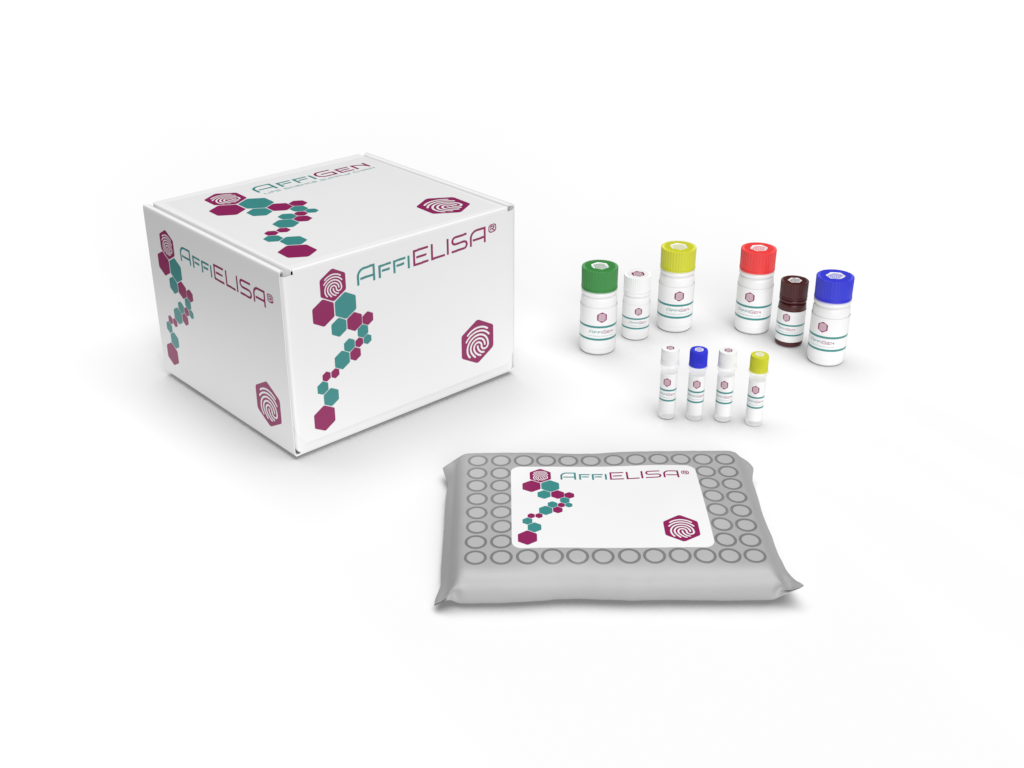AffiELISA® Poultry Babesia Antibody ELISA Kit
The AffiELISA® Poultry Babesia Antibody ELISA Kit is a specialized diagnostic tool designed for the detection and quantification of antibodies against Babesia in poultry samples.
Babesia are protozoan parasites that can infect various animals, including birds like poultry. Infections with Babesia can cause a disease known as babesiosis, which can lead to a range of symptoms and health issues in poultry, including anemia, lethargy, reduced egg production, and in severe cases, mortality.
ELISA, or Enzyme-Linked Immunosorbent Assay, is a widely used laboratory technique that utilizes antibodies to detect specific molecules (in this case, antibodies against Babesia) in biological samples. This kit is designed to detect the presence and quantity of antibodies produced by poultry in response to Babesia infection.
By testing poultry serum or other samples using this ELISA kit, veterinarians and researchers can identify the presence of antibodies against Babesia, aiding in the diagnosis of babesiosis and the surveillance of Babesia infections in poultry flocks. Early detection and monitoring of Babesia antibodies can be crucial for implementing appropriate control measures, managing the health of poultry populations, and preventing the spread of the disease within flocks.
This kit's specificity for detecting Babesia antibodies in poultry allows for accurate and reliable diagnosis, enabling prompt intervention and management strategies to control and prevent the spread of Babesia infections among poultry.
Product Specifications
Species
Poultry
Gene / Target
N/A
Uniprot ID
N/A
Type
N/A
Sample Volume
N/A
Wavelength
450nm
Poultry Babesia Background
The intricate role of estrogen in mouse physiology has garnered significant attention in scientific research. Estrogen, a pivotal hormone, plays a multifaceted role in murine biology, influencing diverse physiological processes ranging from reproductive health to neurological functions. Understanding estrogen's impact on mice offers critical insights into reproduction, behavior, development, and disease pathology.
In mice, estrogen, primarily produced in the ovaries, acts as a key regulator in the estrous cycle, influencing the reproductive cycle and fertility. Beyond reproduction, estrogen receptors are expressed in various tissues, affecting bone density, cardiovascular health, immune response, and cognitive functions. Studying estrogen in mice provides a fundamental model for investigating hormonal influences on health and disease.
Researchers keen on exploring the complexities of estrogen in murine models utilize tools like ELISA assays. These assays, such as the AffiELISA® Mouse Estrogen ELISA Kit, facilitate the quantitative measurement of estrogen levels in serum, plasma, or tissue samples from mice. This kit enables accurate assessments of estrogen concentrations, aiding investigations into hormonal fluctuations, reproductive health, and broader physiological implications.
Babesia in poultry refers to a group of protozoan parasites that can infect various bird species, including chickens, turkeys, and other domesticated birds. Babesia organisms are typically transmitted through the bites of infected ticks, although some species can be transmitted through other means, such as through contaminated needles or blood from infected birds.
Babesiosis, the disease caused by Babesia infection, can have varying effects on poultry, leading to symptoms such as anemia, weakness, reduced egg production, jaundice, and in severe cases, mortality. The severity of the disease depends on factors such as the species of Babesia involved, the bird's age, health status, and the presence of any concurrent infections or stressors.
Diagnosing Babesia infection in poultry often involves identifying the parasites or their genetic material in blood smears or samples, along with serological tests to detect antibodies against Babesia. Specialized tests like ELISA (Enzyme-Linked Immunosorbent Assay) are employed to detect these antibodies in the blood of infected birds, aiding in the diagnosis and surveillance of Babesia infections in poultry flocks.
Preventing Babesia infections in poultry involves implementing measures to control tick populations, maintaining good biosecurity practices, and employing proper veterinary care and management techniques to minimize exposure and spread of the parasites among the flock.
Control and management strategies for Babesia in poultry aim to reduce the impact of the disease, maintain the health and productivity of poultry flocks, and prevent economic losses associated with Babesia infections.
